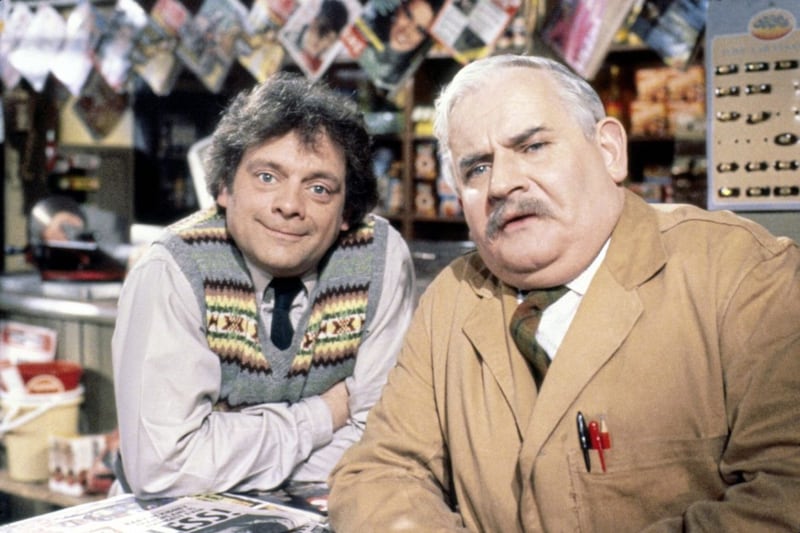Every weekday morning, my mother, armed with a stout string bag, set off to 'do the messages'.
Such was the variety of shops in a triangle of three neighbouring streets, she could buy everything she needed, from a ham hock to a half-set of china, in an hour's round trip.
She was one of a generation of homebound fridge-free wives and mothers who shopped for fresh produce daily and made a social occasion out of necessity.
Women like her were knitted into the fabric of their community in a way their modern, multi-tasking, hyper-tense daughters can never match.
It was no small thing for my mother to be greeted by name by Albert and Eric the grocers, by Patsy and Harry the butchers, to have her bacon sliced by Barney Callan himself and swap news with Mrs Orr as she swaddled the soup vegetables in several sheets of Ireland's Saturday Night.
It boosted her morale as a valued customer to be offered a bentwood chair in Morrison's or McDevitt's and select garments to be conveyed home 'on approval' - delivered by the shop boy on the shop bike of course - with alterations done on the premises by a lady forever circling on her knees with a mouthful of pins.
I'd sit on the doorstep and watch for mother's return, lugging the bulging string bag, knobbly now with cabbages or oranges and maybe a surprise for me.
It was an era of service.
The bread van stopped daily at the door, its rattling wooden trays run out to a rising aroma of sugar and yeast and the jewelled geometry of jam tarts.
The fishman barked his Friday "Fresh herr'n'!" like a seal.
The Braid lemonade lorry pulled up with the tintinnabulation of a thousand bottles of whiskey-coloured effervescence.
The less salubrious brock-cart trundled by, strung with buckets and piled high with stale food-scraps, the sour smell of which lingered in the street long after it had passed.
The small or middle-sized shop with its regular customers and idiosyncratic owner nourished the community in more ways than one. It was at once a forum for exchanging opinions and a monitor and guardian of the status quo.
The cautious camaraderie of the butcher's queue, the gossipy dressmaker's fitting room and the craic in the warm, wee home-bakery contributed to the cohesion of the society they served.
This social pattern survived into the early sixties and I remember the day it changed.
A prescient local businessman fitted out his premises in American self-service 'super-mart' style.
It was the talk of the town.
Mother suggested we "give it a go". We stalked its modest aisles uneasily, feeling ourselves in alien 'behind the counter' territory without permission.
Behind the counter! That sacred space you'd no more trespass on than vault the altar rails!
Taking stuff off the shelves and putting it in a basket unsupervised seemed to us like shoplifting. Mother, deeply dismayed at this impersonal exercise in do-it-yourselfery, predicted the idea would never catch on.
I live two minutes from a large supermarket, open 24 hours a day, six days a week and five hours on Sundays. Anything from sesame seeds to a sink plunger is available under one spacious, fluorescent-lit roof, with free parking and a four-wheel-drive trolley with one nonconformist wheel - but then no shopping experience is perfect.
Mine is quick, comprehensive and (relatively) cheap.
It suits my time-strapped lifestyle. But I get my meat from a 'real' butcher and fish from a 'proper' fishmonger.
I applaud the resurgence of farmers' markets for creating an increased demand for quality, organic and local produce, though you pay extra for the authentic country muck on your spuds and carrots that we used to get for free.
Unable to withstand the winds of change, small shopkeepers were swept away, replaced, in the name of development, by a dual-carriageway so we could all get to the supermarket faster.
But so long as there are disorganised, forgetful people running out of milk, or wanting 10 Park Drive, the local paper, a cream cookie and a bit of banter in the early morning, there'll always be an enterprising Arkwright to provide for them.
The corner shop is dead, they say - but it won't lie down.
Maybe we should slap a preservation order on it?
::This column first appeared in The Irish News in February 2006 and is being reprinted in memory of our much-loved columnist who died on February 1, 2022.









